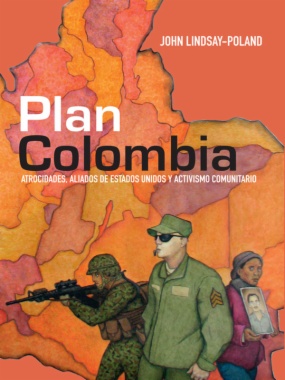
Estás filtrando por
Se encontraron 1869 resultados en recursos

En Plan Colombia John Lindsay-Poland narra la masacre ocurrida en 2005 en la Comunidad de Paz de San José de Apartadó y la subsiguiente investigación, encubrimiento oficial y respuesta de la comunidad internacional. Examina cómo la asistencia militar multimillonaria provista por EE. UU. así como la indiferencia oficial, contribuyeron a las atrocidades cometidas por el ejército colombiano. Con base en su activismo en derechos humanos y entrevistas a oficiales del ejército, miembros de las comunidades y defensores y defensoras de derechos humanos, Lindsay-Poland describe iniciativas de base en...
Fuente:
Digitalia
Formatos de contenido:
Libros
Compartir este contenido
Plan Colombia: Atrocidades, aliados de Estados Unidos y activismo comunitario
Copia el enlace o compártelo en redes sociales
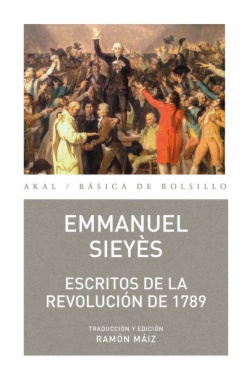
Escritos de la revolución de 1789
En 1788, la convocatoria de los Estados Generales de Francia, tras un intervalo de más de un siglo y medio, permitió a Emmanuel Sieyès publicar Ideas sobre los medios de actuación de que podrán disponer los representantes de Francia en 1789 , donde sienta las bases de su pensamiento político. Escribe Ensayo sobre los privilegios y el mismo año publica su celebrado panfleto: ¿Qué es el Tercer Estado? Comenzaba con la respuesta a la pregunta: «Todo. ¿Qué ha sido hasta ahora en el orden político? Nada. ¿Qué es lo que desea? Ser algo» . El panfleto tuvo mucho éxito, y su autor fue admitido en los clubes...
Fuente:
Digitalia
Formatos de contenido:
Libros
Compartir este contenido
Escritos de la revolución de 1789
Copia el enlace o compártelo en redes sociales
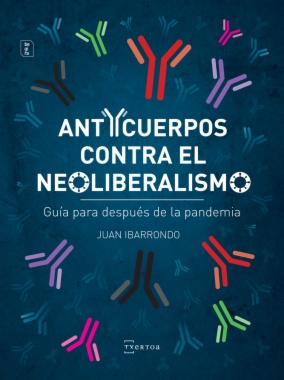
Anticuerpos contra el neoliberalismo
El capitalismo ha demostrado poseer la capacidad de mutar de un virus, lo que le ha permitido ir adaptándose a las nuevas situaciones, a menudo ligadas a grandes catástrofes, y afianzar su supremacía como forma dominante de relación económica y social. Pero, al mismo tiempo, siempre ha habido movimientos emancipatorios, siempre ha habido anticuerpos que han combatido a ese virus, como mínimo, para mitigar sus efectos más perniciosos. Es pronto para decir si la crisis global provocada por el COVID19 será la chispa que provoque o acelere una nueva mutación del virus del capitalismo, pero, por lo que...
Fuente:
Digitalia
Formatos de contenido:
Libros
Compartir este contenido
Anticuerpos contra el neoliberalismo
Copia el enlace o compártelo en redes sociales
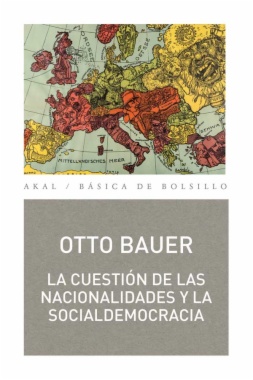
La cuestión de las nacionalidades
La cuestión de las nacionalidades y la socialdemocracia, publicado por Otto Bauer (1881-1938) en 1907, está considerado como uno de los estudios más brillantes y lúcidos del marxismo acerca del problema nacional, cuyos planteamientos sorprenden por su validez y persistencia. Como señala Ramón Máiz, en el estudio preliminar de esta edición, «Bauer elaboró un original concepto de nación como comunidad inesencial, como proceso evolutivo de construcción política, tan abierto y contingente como plural y contestado, el cual le permitió superar la ecuación monista decimonónica, subyacente tanto en los postulados del Estado nacional (un Estado = una Nación), como en su antagonista secular, el Principio de las Nacionalidades (una Nación = un Estado)».
Fuente:
Digitalia
Formatos de contenido:
Libros
Compartir este contenido
La cuestión de las nacionalidades
Copia el enlace o compártelo en redes sociales

Quiero ser presidente
A esta crisis social creo que no le hemos aquilatado todavía su relevancia, estamos frente a una verdadera Revolución. Cuando se escriba la historia en unos años más, octubre del 2019 será más trascendente que muchos episodios del pasado. El diagnóstico de lo ocurrido es más o menos compartido por todos, las soluciones son un tanto más dispares. Como a muchos, a mi también me picó el bichito de mostrar mi visión, o quizás debería decir, algunos de mis sueños. Ojalá que no me salga como una lista de supermercado, pues son un montón de ideas algo dispersas y no todas bien rumiadas, que aspiro pudieran...
Fuente:
Digitalia
Formatos de contenido:
Libros
Compartir este contenido
Quiero ser presidente
Copia el enlace o compártelo en redes sociales

Spectrum
Este libro es un ejercicio sobre la historia de las ideas contemporáneas. Puede considerarse una toma panorámica, de derecha a izquierda, de un paisaje intelectual determinado. Los pensadores y los escritores a los que observa pertenecen a un mundo político en el que las categorías de derecha, centro e izquierda conservan aún visiblemente su significado, aun cuando las localizaciones y los límites de cada uno distan mucho de estar fijados.
Fuente:
Digitalia
Formatos de contenido:
Libros
Compartir este contenido
Spectrum
Copia el enlace o compártelo en redes sociales
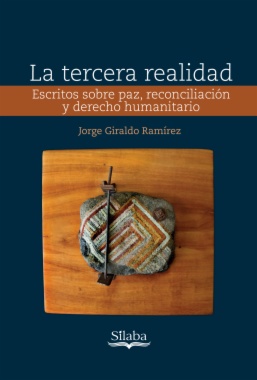
La tercera realidad
Los textos que se reúnen en este libro tienen como trasfondo la historia colombiana entre 1994 y 2014, y reflejan una parte de las discusiones nacionales sobre paz y reconciliación, derechos humanos y derecho humanitario. Son textos disidentes: contra el guerrerismo y el pacifismo ingenuos; contra la laxitud del Estado respecto a los límites de los actos legítimos de la fuerza pública y contra la violencia guerrillera ensañada con los más humildes; contra el espíritu reaccionario que detesta los derechos humanos y contra los que los usaron como un instrumento arrojadizo en medio de la niebla de la...
Fuente:
Digitalia
Formatos de contenido:
Libros
Compartir este contenido
La tercera realidad
Copia el enlace o compártelo en redes sociales
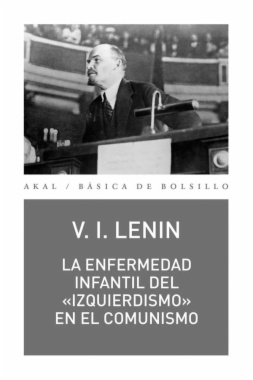
La enfermedad infantil del «izquierdismo» en el comunismo
El enorme impacto de la Revolución rusa hizo que en los partidos socialdemócratas de toda Europa comenzasen a surgir agrupaciones de izquierdas, que acabaron convirtiéndose en los diferentes partidos comunistas, atrayendo a millones de trabajadores que empezaban a ver posible la construcción de otro mundo, sin desigualdad y pobreza. Sin embargo, la falta de experiencia de los jóvenes dirigentes comunistas provocaba que siguieran una política en ocasiones sectaria y ultraizquierdista, alejada de la clase trabajadora y de las tradiciones bolcheviques que decían defender. Para tratar de corregir esta...
Fuente:
Digitalia
Formatos de contenido:
Libros
Compartir este contenido
La enfermedad infantil del «izquierdismo» en el comunismo
Copia el enlace o compártelo en redes sociales

Vivo como hablo
Vivo como hablo es el título que Julio Anguita sugirió para este libro. Su fallecimiento acontecería días después de la entrega del manuscrito a la editorial.La última parte de Combates de este tiempo recoge el testigo de aquel volumen a través de nuevos textos y discursos que dedica a la apasionante era política que nos ha tocado vivir: la ruptura del bipartidismo, la corrupción en las altas esferas, los cambios en el seno de la izquierda, la irrupción de nuevas formaciones políticas, la constitución del primer gobierno progresista de coalición de la Democracia, la crisis sanitaria del coronavirus.
Fuente:
Digitalia
Formatos de contenido:
Libros
Compartir este contenido
Vivo como hablo
Copia el enlace o compártelo en redes sociales
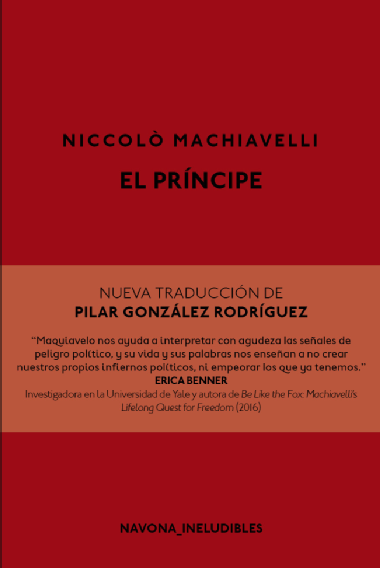
El príncipe
El Príncipe es, sin duda, un clásico en el sentido más literal del término, pero también uno de los libros peor leídos de la historia por cuanto el maquiavelismo hoy se hace equivalente al uso del poder político sin prejuicios, en el que el fin justifica cualquier medio. Sin embargo, el autor se centró en la investigación del funcionamiento del Estado y en la psicología de sus gobernantes. A partir de un vasto inventario de la historia, se esforzó por extraer las relaciones, las constantes, las leyes, en definitiva, que permiten a los Estados durar o prosperar.
Fuente:
Digitalia
Formatos de contenido:
Libros
Compartir este contenido
El príncipe
Copia el enlace o compártelo en redes sociales
Selecciona las Colecciones en las que vas a añadir el contenido
Para consultar los contenidos añadidos busca la opción Tus colecciones en el menú principal o en Mi perfil.
